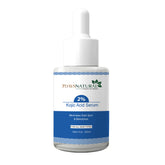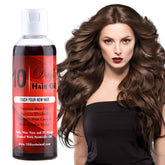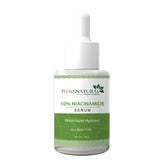What Causes Dandruff? Best Anti-Dandruff Shampoo with Natural Ingredients
What is Dandruff?
Dandruff is a widespread scalp condition where small white or yellow flakes of dead skin shed from the scalp. It can make the scalp feel itchy, dry or oily. Dandruff is usually caused by factors like.

· Overgrowth of a natural fungus (Malassezia) on the scalp
· Excess oil production
· Dry skin
· Sensitivity to hair products
· Weather changes, especially cold or dry air
It’s not contagious, but it can be a recurring scalp condition. Regular use of dandruff shampoo and proper scalp care typically helps control dandruff.
Dandruff causes regular hair fall and itching. This can be an irritating factor in your life.
What causes Dandruff?

· Excess Oil production - Excess oil production on the scalp creates an environment where the Malassezia fungus (naturally present on the skin) grows more quickly. This fungus breaks down the oil into fatty acids that can irritate the scalp, leading to itching, redness, and flaking. The mixture of oil, dead skin cells, and fungal activity results in visible dandruff flakes.
· Stress & Fatigue - Stress and fatigue don’t directly create dandruff, but they weaken the body’s immune system and disturb the natural balance of the scalp. When you’re stressed or overly tired, the body produces more hormones like cortisol, which can increase oil (sebum) production. This extra oil makes it easier for the Malassezia fungus to overgrow, causing itching, irritation, and flakes. Stress also slows down skin repair, so dead skin cells shed unevenly, worsening dandruff.

· Sensitivity to hair care products (shampoos, gels, sprays) - Sensitivity to hair care products can cause dandruff because some shampoos, conditioners, dyes, or styling gels contain harsh chemicals, fragrances or alcohol that irritate the scalp. This irritation may lead to redness, itching, and flaking, which looks like dandruff. In some people, the scalp reacts by becoming dry and peeling, while in others, it produces extra oil, creating conditions for fungal overgrowth. Both situations trigger dandruff-like symptoms.
· Unhealthy diet – An unhealthy diet can play a major role in causing dandruff. A deficiency of essential nutrients such as zinc, vitamin B6, vitamin B12, and omega-3 fatty acids weakens scalp health, making it more prone to dryness and flaking. Consuming too much sugar or processed, oily foods can increase oil production on the scalp, encouraging fungal overgrowth that leads to itching and dandruff. In addition, not drinking enough water results in poor hydration, leaving the scalp dry and flaky, which further worsens dandruff symptoms.
Why is scratching hair not good for scalp health?
Scratching the scalp when you have dandruff is not good for several reasons:
1. Skin damage – Scratching can break the scalp’s surface, causing small cuts or wounds.
2. Worsens irritation – Instead of relief, scratching increases itching and inflammation.
3. Spreads flakes – Vigorous scratching loosens more dead skin, making flakes more visible on hair and clothes.
4. Risk of infection – Open scratches allow bacteria or fungi to enter, leading to scalp infections.
5. Weakens hair roots – Constant scratching can stress hair follicles, causing hair breakage or hair fall.
7DaysNatural Peptide+Biotin Dandruff Shampoo
7DaysNatural Peptide+Biotin Dandruff Shampoo is endowed with the goodness of Neem Oil, Tea Tree Oil, Salicylic Acid and ZPTO (Zinc Pyrithione). It is one of the best dandruff shampoos available in the market at present.

ZPTO(Zinc Pyrithione) - ZPTO (Zinc Pyrithione) is added to dandruff shampoos because it has antifungal and antibacterial properties. Since dandruff is often linked to the overgrowth of the scalp fungus Malassezia, ZPTO helps control fungal growth, reducing itching, flaking, and scalp irritation. It also helps regulate excess oil production, keeping the scalp healthier.
Neem Oil - Neem oil is added to dandruff shampoos because it has strong antifungal, antibacterial, and anti-inflammatory properties. These qualities help fight the Malassezia fungus that causes dandruff, reduce itching and scalp irritation, and prevent infections from scratching. Neem oil also nourishes the scalp, keeps it moisturized and promotes healthier hair growth, making it a natural remedy for controlling dandruff.
Tea Tree Oil - Tea tree oil is used in dandruff shampoos because it has natural antifungal and antibacterial properties that target the scalp fungus (Malassezia) responsible for dandruff. It also helps reduce itching, irritation, and inflammation, while gently cleansing excess oil and buildup from the scalp. Additionally, tea tree oil promotes a healthier scalp environment, which reduces flaking and supports stronger, shinier hair.
Salicylic Acid - Salicylic acid is added to dandruff shampoos because it works as a keratolytic agent, meaning it helps loosen and shed dead skin cells from the scalp. This reduces the buildup of thick, scaly flakes often seen in dandruff and seborrheic dermatitis. By gently exfoliating the scalp, salicylic acid also allows other active ingredients (like antifungals) to work more effectively. Additionally, it helps unclog hair follicles, control oiliness, and keep the scalp cleaner.
Our wonder formula hydrates dry scalp and does a gentle deep cleanse, giving you hair that you have always dreamed of.
How to use?
- Apply to the scalp, massage gently, and leave overnight.
- Massage into a wet scalp, lather, and rinse to cleanse, strengthen, and repair hair.
- Apply to mid-lengths and ends, leave for 2–3 minutes, then rinse for smooth, nourished hair.
FAQ’s
1. What causes dandruff?
Dandruff is mainly caused by the overgrowth of a scalp fungus called Malassezia, excess oil production, dry skin, or sensitivity to hair care products. Stress, poor diet, and weather changes can also make it worse.
2. How do dandruff shampoos work?
Dandruff shampoos contain active ingredients like Zinc Pyrithione (ZPTO), Ketoconazole, Salicylic Acid, Neem Oil, or Tea Tree Oil that control fungal growth, reduce flaking, and soothe scalp irritation.
3. How often should I use a dandruff shampoo?
Usually, 2–3 times a week is enough. For severe dandruff, daily use may be recommended initially, then reduced once symptoms improve.
4. Can dandruff shampoos be used on coloured or treated hair?
Most dandruff shampoos are safe, but some may strip colour or dry out chemically treated hair. It’s best to choose a gentle, sulphate-free formula and follow with a conditioner. Use 7DaysNatural Peptide + Biotin Dandruff Shampoo for the best results. It is one of the best natural dandruff treatments.
5. Does dandruff mean poor hygiene?
No. Dandruff is not caused by poor hygiene. However, infrequent hair washing can allow oil and flakes to build up, making dandruff more noticeable.






Leave a comment
Please note, comments need to be approved before they are published.